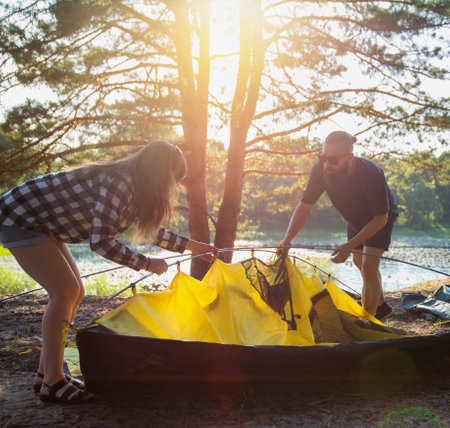Preparing for Your Fishing Adventure
Before you cast your line in the tranquil waters of the British countryside, meticulous preparation is key to a successful fishing and camping experience. First and foremost, research campsites located near renowned fishing spots—look for locations along rivers like the Wye or lakes in the Lake District, where angling opportunities are plentiful. Proximity to water not only maximises your fishing time but also immerses you fully in nature’s rhythm.
British weather is famously unpredictable, so packing appropriate kit is non-negotiable. Layered clothing, waterproof outerwear, sturdy boots, and a reliable bivvy bag will see you through rain, mist, and the occasional burst of sun. Don’t forget essentials such as thermal socks, a warm hat, and fingerless gloves for those crisp early mornings by the water’s edge. Bring a quality torch or headlamp—darkness falls quickly out here—and always carry extra batteries.
Equally vital is your commitment to leave-no-trace principles. The British countryside is cherished for its wild beauty; show respect by packing out all rubbish, avoiding single-use plastics, and using biodegradable soaps if washing is necessary. Be mindful of local wildlife and stick to established paths to minimise your impact on delicate habitats. Responsible anglers ensure the landscape remains unspoilt for generations to come.
Understanding UK Fishing Regulations
Before casting your line in the British countryside, it’s essential to understand the legal framework that governs fishing across the UK. Compliance isn’t just about avoiding fines—it’s about respecting local ecosystems and ensuring the longevity of our wild waterways for future generations. Here’s what every angler should know before setting up camp by the water.
Rod Licences: Your First Priority
If you’re planning on fishing for salmon, trout, freshwater fish, or eels in England (excluding the River Tweed), Wales, or the Border Esk region in Scotland, you’ll need a valid rod fishing licence. These can be purchased online from the Environment Agency or at most Post Offices. Be aware: fishing without a licence can result in hefty penalties and confiscation of equipment.
| Type of Licence | Duration | Cost (2024) |
|---|---|---|
| Trout & Coarse Fish | 1 Day / 8 Days / 12 Months | £6 / £12 / £33 |
| Salmon & Sea Trout | 1 Day / 8 Days / 12 Months | £12 / £27 / £86 |
Local Bylaws: Know Before You Go
Each region has its own set of bylaws that dictate where, when, and how you can fish. Some waters are private or require additional permits from angling clubs or landowners. Check signage at fishing spots and consult local authorities or angling associations for up-to-date information on:
- Bait restrictions (live bait, maggots, groundbait)
- Fishing methods (fly only, catch-and-release zones)
- Bag limits and size restrictions
Closed Seasons: Protecting Wildlife
The UK enforces closed seasons to protect spawning fish populations. For coarse fish in rivers across England and Wales, the closed season typically runs from 15 March to 15 June inclusive. Salmon and trout have their own specific close times depending on river systems—so always check before heading out.
| Species/Water Type | Closed Season Dates |
|---|---|
| Coarse Fish (Rivers) | 15 March – 15 June |
| Trout (Rivers) | Varies by location (consult local bylaws) |
No Shortcuts—Stay Legal!
The complexity of UK fishing regulations means preparation is key. Sort your paperwork before you leave home, research your chosen spot’s rules, and respect all local signage. This not only ensures your adventure remains hassle-free but also demonstrates true sportsmanship and care for Britain’s treasured waterways.

3. Essential Gear for the British Wilds
When it comes to fishing while camping in the unpredictable British countryside, your kit can make or break the experience. The weather here is notoriously fickle—one minute it’s blue skies, the next you’re lashed by a cold drizzle rolling in from nowhere. As any seasoned angler will tell you, preparation is everything. Here’s what you’ll need to stay dry, comfortable, and ready for whatever the wild throws at you.
Weatherproof Shelter: The Bivvy
A rugged bivvy is the backbone of any serious wild fishing setup. Unlike flimsy tents, bivvies are built to withstand British gales and persistent rain. Opt for a model with reinforced seams and a heavy-duty groundsheet; condensation can be a nightmare on dewy mornings. Look for quick-erect designs so you can pitch up fast if the weather turns sour. Don’t skimp on storm poles—they’re your first line of defence against sideways wind and rain.
Traditional Tackle: Rods, Reels & Terminal Gear
British waters demand specific tackle. For most coarse and carp fishing, a 12-foot rod matched with a reliable baitrunner reel is standard issue across English lakes and rivers. Keep your end tackle subtle: use barbless hooks (a legal requirement on many waters), supple braided hooklinks, and inline leads to minimise fish stress and comply with local rules. For fly-fishing, a 9-foot rod rated for 5 or 6 weight lines handles native trout beautifully in wild streams.
Clothing Built for Survival
Forget fashion—pack for survival. Layer up with moisture-wicking thermals, a fleece mid-layer, and a tough, waterproof shell jacket. Wellington boots or hardy walking boots are essential for boggy banks and muddy footpaths. Don’t overlook fingerless gloves for knot-tying dexterity or a wide-brimmed hat to fend off both drizzle and sun.
Ancillary Kit: The Unsung Heroes
No British fishing trip is complete without certain unsung heroes: an unhooking mat to protect catches, a sturdy landing net suited to local species, and an insulated flask filled with hot tea—a true British staple when dawn chills bite hard. Pack a headtorch with spare batteries; twilight creeps in fast along rural rivers.
Local Knowledge: Check Rules & Etiquette
The British countryside holds sacred traditions. Always check local bylaws before casting out—many waters require Environment Agency rod licences and enforce closed seasons or catch limits. Respect other anglers’ space, leave no trace behind, and remember: nothing ruins a session like forgetting your waterproofs or running out of Yorkshire Tea.
4. Techniques and Tips for Catching Local Species
When fishing in the British countryside, knowing your target species and adapting your approach is the bedrock of success. Whether you’re stalking roach in a slow-flowing river or hunting carp in a misty reservoir at dawn, your tackle and tactics need to match the conditions and the fish’s habits. Below, we break down hard-nosed advice for lure choices, bait, and tried-and-true angling methods across coarse, game, and carp fishing.
Coarse Fishing: Rivers & Lakes
Coarse fishing dominates much of the UK’s inland waters. Here’s what works when targeting common species:
| Species | Bait | Lure/Method | Best Tactic |
|---|---|---|---|
| Roach & Rudd | Maggots, bread punch, sweetcorn | Waggler float, stick float | Light tackle with small hooks; loose feed regularly to attract shoals |
| Perch | Lobworms, small minnows | Small spinners, soft plastics | Fish close to snags or marginal reeds early morning or dusk |
| Tench & Bream | Sweatcorn, worms, casters | Feeder rigs, method feeder | Pre-baiting area increases chances; patience is key—wait for rolling bites |
Game Fishing: Rivers & Streams
If you’re pursuing trout or grayling in upland streams or chalk rivers, finesse and local knowledge are vital. Use light lines (2–4lb) and size 16–18 hooks. For brown trout, try a well-presented worm or a classic dry fly like the Adams or Klinkhammer during a hatch. Grayling respond best to maggots on a trotting rig or small nymphs worked through riffles. Always check local byelaws regarding permitted baits and seasons.
Carp Fishing: Reservoirs & Stillwaters
The British carp scene is legendary, demanding both patience and tactical nous. Boilies remain a staple bait, but don’t overlook traditional options like sweetcorn or luncheon meat—especially on pressured waters. Use hair rigs to present bait naturally. Spodding out a bed of particles can draw in wary specimens. Early morning and late evening typically see the most action. For surface-feeding carp on hot days, freelining dog biscuits or bread crust is deadly.
Lure Choices by Water Type
| Water Type | Lure Recommendation | Notes |
|---|---|---|
| Lakes/Stillwaters | Diving plugs, poppers for perch/pike; soft pellets for carp/coarse fish | Use subtle retrieves; watch for surface activity at dawn/dusk |
| Rivers/Streams | Spoons/spinners for trout/perch; stick floats for silver fish | Work lures downstream with current; adjust weight for flow rate |
| Reservoirs | Zig rigs with foam for mid-water carp; jerkbaits for predators like pike/zander | Fish deeper layers during midday; wind direction influences feeding zones |
No-Nonsense Survival Angling Advice:
- Travel light: Take only essential gear—rucksack, rod holdall, compact seat box.
- Bait variety: Always carry back-up bait; weather shifts can change what fish want.
- Observe: Spend time watching water for signs—rolling fish, bubbles, birds diving indicate hotspots.
- Tidy rigs: Keep knots strong and end tackle neat—lost fish haunt you longer in wild country.
The British countryside rewards anglers who adapt quickly and approach each session with sharp technique and local savvy. Master these fundamentals and youll not only catch more fish but savour every wild moment bankside.
5. Staying Safe and Respecting the Countryside
Camping and fishing in the British countryside is an adventure that comes with its own set of challenges and responsibilities. To ensure your trip is both enjoyable and safe, you must prioritise personal safety, respect wildlife, and strictly adhere to the Countryside Code.
Personal Safety in Remote Areas
When venturing into secluded spots, preparation is paramount. Always inform someone of your intended location and expected return time. Mobile reception can be patchy in rural Britain, so carry a fully charged phone and consider a backup power bank. Essential survival gear includes a reliable torch, weatherproof clothing, a well-stocked first aid kit, and enough food and water for your stay. Take note of the local weather forecast before heading out; British weather can turn rapidly, so pack layers and waterproofs as standard. If wild swimming or wading to fish, assess the water depth and current before entering — never take unnecessary risks.
Wild Animal Awareness
The British countryside is home to diverse wildlife, including deer, badgers, foxes, adders (Britain’s only venomous snake), and occasionally wild boar in certain regions. Most animals will avoid humans if left undisturbed. Store all food securely to avoid attracting unwanted visitors to your camp. Be particularly vigilant at dawn and dusk when many animals are most active. If you encounter livestock or wildlife, maintain a respectful distance — never approach or attempt to feed them.
Adhering to the Countryside Code
The Countryside Code is the backbone of responsible outdoor activity in Britain. Key principles include: leaving gates as you find them, taking all litter home (including fishing lines and hooks), avoiding disturbance to wildlife habitats, and keeping noise to a minimum. Stick to designated footpaths where possible and always seek landowner permission before camping or fishing on private property. Fires are generally discouraged unless in designated areas; use a portable stove if you must cook. By following these guidelines, you help preserve Britain’s natural beauty for future generations while ensuring your own safety during your wild camping and fishing adventures.
6. Campfire Cooking: Preparing Your Catch
Step 1: Cleaning Your Fish Responsibly
Once you’ve landed your catch, it’s essential to clean it properly and responsibly. Use a sharp knife to gut the fish, starting from the vent and slicing up towards the gills. Remove the entrails and rinse the fish thoroughly with clean water from your supply—never in the river or lake, as discarded innards can harm local wildlife. Bag and pack out all waste, respecting the countryside code and leaving no trace.
Step 2: Gathering Local Ingredients
Enhance your meal with what’s around you. Forage for wild garlic, nettles, or watercress if you’re confident in plant identification, or bring along staples like Maris Piper potatoes, British butter, and a lemon from your camp provisions. A sprinkle of Maldon sea salt and cracked black pepper will bring out the flavour of any freshwater fish.
Step 3: Building a Proper Campfire
Construct a safe fire using deadwood collected from the ground—never break branches off living trees. Clear a space down to mineral soil and build a small, contained fire. Let it burn down until you have glowing embers, ideal for even cooking without scorching your hard-earned catch.
Traditional British Methods for Cooking Fish
- Foil Parcel: Wrap your gutted fish in foil with a knob of butter, local herbs (like parsley or thyme), sliced potatoes, and a squeeze of lemon. Place directly on the embers for 10–15 minutes depending on size.
- Spit Roasting: Skewer the fish on a green stick and prop it over the fire. Turn occasionally for even cooking—perfect for trout or perch.
- Batter & Pan Fry: If you’ve brought a cast-iron pan, dust fillets in seasoned flour (try adding English mustard powder) and fry in butter or rapeseed oil until crisp.
Savouring Your Campfire Meal
Once cooked through—the flesh opaque and flaking easily—serve immediately. Sit back, perhaps with a mug of strong Yorkshire tea or a splash of cider, and enjoy the fruits of your labour under open skies. Savour each bite knowing you’ve honoured both tradition and nature by preparing your catch with care and respect for the British countryside.


